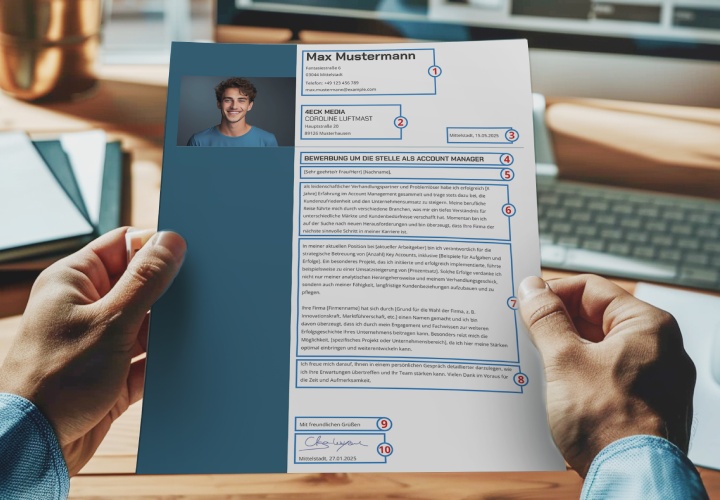Soft skills, hard skills, and self-development
Your professional future depends on the balance between Hard Skills and Soft Skills. With increasing digitalization and the use of AI, the requirements for professionals are changing rapidly. Hard Skills form the foundation of your profession, while Soft Skills help you to work successfully in a team and advance your career. In our articles, you will learn how to develop your skills purposefully, which competencies are particularly in demand today, and how to best prepare yourself for the requirements of the modern working world.
Develop your skills before AI takes over your job!
What doesn't kill you makes you stranger. Develop your hard and soft skills!
Hard skills and soft skills: The basics for your future
Many claim that progress has come to a standstill. That's not true. Artificial intelligence is increasingly replacing mental work, similar to how machines replaced physical work during the industrial revolution. AI paints pictures, composes music, writes poems. This is just the beginning – imagine what will be possible in five years. However, the situation is more nuanced. Today, AI is a powerful tool for trained specialists that significantly accelerates work. For a successful career, you therefore need Soft Skills and Hard Skills, coupled with continuous self-improvement. You must continuously learn new things and improve year after year. In the articles in this category, we show you the right development path.
In the tough competition in the job market, consider the following situation: Two professionals apply for a position. Both have a good education and similar work experience. The first is an excellent expert but introverted and has difficulty interacting with people. The second has slightly less experience but works excellently in a team, learns quickly, and adapts well to changes. Guess who the employer hires?
The competition in the job market is growing daily. Companies value employees who are willing to further develop themselves within the organization. Quick learning ability, flexible thinking, emotional understanding – these qualities determine the success of modern professionals. Learn more about the development of professional and personal qualities in our articles about Hard and Soft Skills.
Hard Skills - your professional foundation
Hard Skills are measurable professional skills that can be learned at universities or in courses. These are specific skills that are necessary for work: programming, foreign language skills, handling of specific equipment, legal knowledge, accounting. These skills can be easily assessed through tests or practical tasks.
Professional skills form your foundation. Knowledge of programs, mastery of technologies, understanding of work processes – all of this determines your value as a professional. However, today it is no longer enough to do your own work well. The market is looking for specialists who can use AI technologies, analyze Big Data, and utilize new tools.
As a simple example: in the past, a graphic designer only needed knowledge in Adobe Photoshop and basics of composition. Today, a successful designer must work with Figma, be knowledgeable in UX/UI, create animations, and be able to use AI systems for image creation. This situation exists in all professions – technologies are changing the requirements for professionals.
How do you keep up with these changes? Start by evaluating your current skills. Make a list of your knowledge and compare it with market demands. Identify knowledge gaps and start filling them. Get to know new tools, try out modern approaches, experiment with technologies. Remember: every new skill expands your opportunities and increases your value in the job market.
Hard Skills VS Soft Skills
Soft Skills are social abilities and personal qualities that help to work effectively and build relationships with people. Unlike Hard Skills, they are difficult to measure, but often determine the success of a professional in a team and in their career. Developing Soft Skills is more challenging than learning professional skills – they require constant practice and intense self-work. Soft Skills are particularly important for people who work with others: managers, executives, HR specialists.
Emotional intelligence, active listening, teamwork, presentation skills, conflict management – these are examples of Soft Skills. A professional with developed social skills advances in their career more quickly, gets along better with colleagues and superiors, and handles stressful situations more successfully.
Let's consider a typical office situation: a complex project is underway, deadlines are tight, tension within the team is rising. A technical specialist with developed Soft Skills can not only do their job well, but also help the team remain productive. They can reduce tensions, find compromises, and motivate colleagues.
The good news: Social skills can be learned. Start small: Practice active listening, learn to give constructive feedback, develop empathy. Read our articles on the development of Soft Skills and apply what you learn in practice.
So what's more important – Hard Skills or Soft Skills? It's like asking what's more important – the schnitzel or the salad in a balanced lunch. If you're not a vegetarian, you need both. Hard Skills are your professional foundation, Soft Skills are the ability to effectively use and develop this foundation in a team. A successful career is built on the balance of both skills.
Self-Development: Methods and Paths
Personal development should not only depend on work requirements or employers. It is the basis for success in all areas of life. Without constant growth, it is impossible to feel mentally well in the workplace. Yes, some development programs can be provided by your employer – companies are interested in the development of their employees. However, the greatest successes come from personal initiative for self-development.
You should constantly seek new improvement opportunities, read about development methods, and try out different approaches to improve your skills. The results of this self-work manifest in two directions – practical and psychological.
The practical results are obvious: You complete tasks faster and better, gain time for new projects, your work efficiency increases. This naturally leads to a salary increase, which positively impacts your life, your family, and your hobbies.
The psychological aspect is equally important. You feel your professional strength growing and your self-confidence increasing. The feeling of constant progress gives you a powerful emotional boost. You become a valuable team member, your opinion is heard, your experience is respected. This creates a positive cycle: successes motivate for new achievements, and achievements strengthen self-confidence.
You can read more about methods and paths of self-development in our articles. We have compiled the best practices and proven approaches for personal growth for you. We wish you a swift professional development and unwavering self-confidence!








